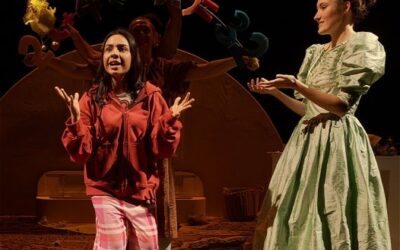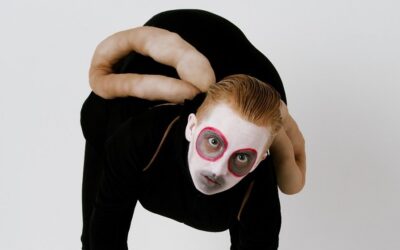By Darby Turnbull
When the great writer, James Baldwin died, he left behind the preliminary notes and beginnings of Remember this House which was to be an exploration on the state of the United States of America through the prism of three titans of the Civil Rights movement; Medgar Evars, Malcom X and Dr. Martin Luther King Jr, all three assassinated within 5 years of each other. Jeff Stetson’s The Meeting takes up some of that mantel, imagining a single evening encounter between Malcom and Martin weeks before Malcom’s assassination where the two confront and debate their own radically different approaches to the fight for Civil rights.
Dr. King’s pacifism and radical kindness was countered by X’s more militant direct action. Stetson’s text has the immense challenge of depicting two icons not just as mortal men with families and homes, loves, flaws but the enormity of what they represented and the legacies that have shaped both them in their life consuming activism. Stetson has curated a kind of speculative docu drama, the dialogue and themes are heavily expositional with vital pieces of information having to be conveyed to audience members without prior knowledge of recent American History (as I suspect will be a vast majority of the audience in Melbourne) and an engaging character study. Most of his dialogue is incredibly laden with some awkward expositional dialogue and heavy metaphors. The writing soars when they connect as individuals both in opposition and alliance when the speech becomes more organic and revealing.
For example, despite Akhilesh Jain’s commendable stage presence, the role of Rashad, Malcom’s body guard is mostly superfluous to the action, more a function to deliver information, which seems a wasted opportunity to explore a third point of view or provide some context for the wider movement. Mr. Jain makes the most of his brief moments on stage and thinly sketched role by passionately portraying the acolyte devotion Malcom X inspires.
Director Tanya Gerstle’s sensuous production beautifully emphasis moments of intimate tenderness. Her coup d’ theatre is to have both men on stage shaving and dressing as the audience enter; they exchange banter and casual touch which immediately puts the audience in the space of witnessing something private and personal. It also allows us to adjust our brains to the fact that we’re watching a play and adjust our unconscious suspension of disbelief as well as marvel at the skill of the actors embodiment.
Dushan Phillips and Christopher Kirby’s performances, I will say right off the bat, are currently sitting at the peak of a year of outstanding performances. The kind of work they’re delivering on the Red Stitch stage is an insurmountable gift for theatre lovers.
What often evades performers playing real people is getting lost in the magnitude of playing someone so iconic, some performers get lost in perfecting vocal tics and mannerisms but losing the soul.
Not so with Phillips and Kirby; based on footage I’ve seen of both men they’re both doing credible work at embodying key parts of their unique personalities but these two actors are performing with their whole bodies and conveying a raw, lived in history.
Dushan Phillips, in everything I see knocks my socks off with his range and magnetism, from Angels in America to Stay Woke he finds new ways to harness his charisma in increasingly insightful ways. His Dr King displays tactical geniality, Phillips fascinatingly conveys King’s commitment to his ideals whilst also showing the shrewd diplomat who’s playing a very long game with incremental yet vital gains. We don’t get to see King ‘on’ incubating his legendary oratory skills but a softer, more grounded and ultimately genuine figure of strength and compassion.
Christopher Kirby is breathtaking as Malcom X; the sheer force of his performance ignites the space so it almost doesn’t feel big enough for it. Listening to Malcom’s outraged assertion that African liberation must be taken by stealth using the weapons that white supremacy have used for centuries to retain the humans they’ve subjugated is especially potent as we watch this play when we never cease to bare witness to the violence inflicted on non white bodies.
Kirby shows Malcom the clear eyed radicalism but also the grim knowledge that his heroism will cost his life, Martins and so many others.
Each actor brings painful nuance to the trauma of living in a black body in America and the ways their lived experience has carved them both; from segregation to lynching; chillingly represented by a noose Malcom confronts him with. Philips asserts Martin’s deep anger through his gentle, southern lilt that looses its gild and becomes jagged when describing the ritual humiliation of his fellows. Kirby will stop your heart half a dozen times when Malcom centres himself and becomes so vulnerable it burns the skin. Richard Vabre’s lighting design understands the pathos of illuminating faces and bodies in just the right shade and with two such extraordinary subjects it’s vital that their work is accentuated as well as it is. Peter Mumford’s Set and costume are likewise subtle and elegant, allowing the actors to work and connect with each other through different paces and emotional shifts without distraction. Justin Gardam’s sound design gorgeously evokes the sumptuous tones of a metropolitan city in 60’s with some well chosen jazz.
Stetson’s text is a vital exploration of the humanity eroding cost of living under and fighting against white supremacy. He wisely explores the cost to families, communities and individuals, the differences in privilege when it comes to access to platforms and proximity to white power and how the messages of both these men will be contextualised and appropriated long after their murders. Short, digestible Dr. King quotations have become easily shared memes in service of performative activism without deeper engagement into what he represented. Likewise, Malcom X’s prophesies have never stopped being prescient; the Black Lives Matter movement as a continuation of the civil rights movements is still having to fight the same battles despite some social integration and white power structures shrill denial or deferment of racism that is still costing people their dignity and their mortality.
I am not qualified to write with any authority on how well this production represents the lived experience of people who experience racism beyond my engagement as a white audience member and where it sits within the broader context of the global civil rights movement but I’m grateful of the opportunity to see this production. Incidentally this is the second play I’ve seen with Martin Luther King having a hotel room confrontation, the first being Katori Hall’s The Mountaintop. Maybe Suzan-Lori Parks could write a hotel room set play featuring King and Angela Davis to make a trilogy.




